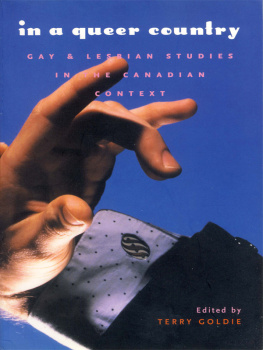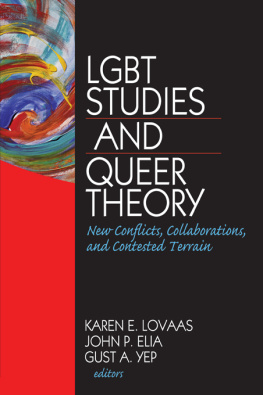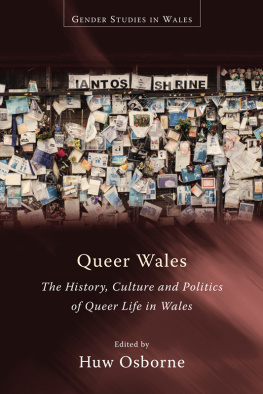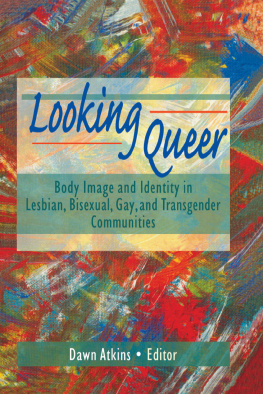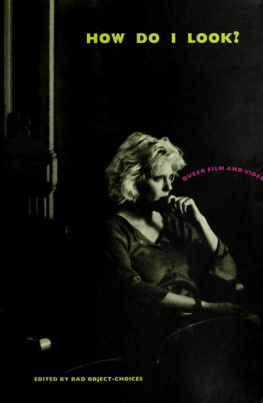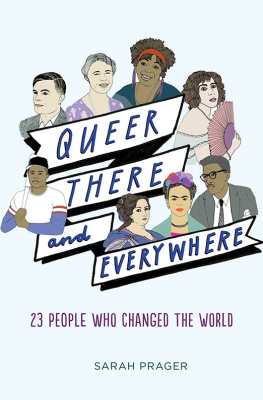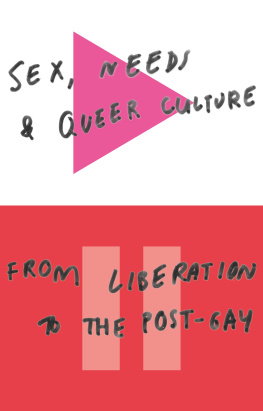
in a queer country
GAY and LESBIAN STUDIES in the CANADIAN CONTEXT
Edited byTERRY GOLDIE
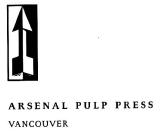
IN A QUEER COUNTRY
Introduction copyright 2001 by Terry Goldie
Essays copyright 2001 by the Contributors
All rights reserved. No part of this book may be reproduced or used in any form by any meansgraphic, electronic or mechanicalwithout the prior written permission of the publisher, except by a reviewer, who may use brief excerpts in a review, or in the case of photocopying, a license from the Canadian Copyright Licensing Agency.
ARSENAL PULP PRESS
Suite 101; 211 East Georgia Street
Vancouver, B.C.
Canada V6A 1Z6
www.arsenalpulp.com
The publisher gratefully acknowledges the support of the Canada Council for the Arts and the B.C. Arts Council for its publishing program, and the support of the Government of Canada through the Book Publishing Industry Development Program for its publishing activities.
Design by Val Speidel
Cover photograph by Kevin Madill
Printed and bound in Canada
CANADIAN CATALOGUING IN PUBLICATION DATA
Main entry under title:
In a queer country
Includes bibliographical references.
ISBN 1-55152-105-9
1. GaysCanada. 2. LesbiansCanada. I. Goldie, Terry.
HQ75.16.C3152 2001 305.906640971 C2001-911290-4
CONTENTS
Terry Goldie
Terry Goldie
Elaine Pigeon
Terry Goldie
Buller Men and Batty Bwoys:
Hidden Men in Toronto and Halifax Black Communities
Wesley Crichlow
Family as a Site of Contestation:
Queering the Normal or Normalizing the Queer?
Michelle K. Owen
Can You See the Difference?:
Queerying the Nation, Ethnicity, Festival, and Culture in Winnipeg
Pauline Greenhill
Zo Newman
Imagining an Intercultural Nation:
A Moment in Canadian Queer Cinema
James Allan
bj wray
Having a Gay Old Time in Paris:
John Glasscos Not-So-Queer Adventures
Andrew Lesk
Gordon Brent Ingram
Gary Kinsman
Catherine Nash
Andrea N. Frolic
Thomas Waugh
Earlier versions of these papers, with the exception of the interview with Lynne Fernie and Terry Goldies Queer Nation?, were given at the Queer Nation? conference. Held in March 1997, it was sponsored by the Robarts Centre for Canadian Studies, York University. I would like to acknowledge the assistance provided by the acting director of the Centre, Carole Carpenter, the administrative assistant, Krystyna Tarkowski, and the graduate assistants, Michelle Power and Tamara Stieber. For the present volume I would also like to thank the energetic commitment of Robert Ballantyne and Mel McLean at Arsenal Pulp Press. Finally, I would like to thank various arms of York University for financial support for the conference and for this publication.
Terry Goldie
i n a Queer Country is a collection of extended and updated versions of papers given at the Queer Nation? conference, on lesbian and gay approaches to Canadian studies, at York University in Toronto in March 1996. As any reader might guess, there are many steps and missteps in the journey from the conference to the book. One part of that process has been the title. I thought the reference to the Queer Nation movement, quibbled by the question mark, was at once cute and informative. As well as the nation, it might be seen to question queer, which I was using primarily as shorthand for gays and lesbians, but which of course is often used to include what has been called the alphabet soup of sexual diversity: bisexuals, transsexuals, intersexed, etc. Many, however, including several of the contributors, thought that it implied an acceptance of queers in Canada, which denies the homophobia most have experienced.
In a Queer Country: Gay and Lesbian Studies in the Canadian Context is a bit of a compromise, as is no doubt suitable. It offers possible suggestions of the compromising position that many political theorists have long asserted is the Canadian way of life. The title implies the contradictions of Canadian geography, in which our claims to the North are met by our tendency to live close to the southern border, in which our rural heritage is met by our tendency to live in cities, and in which our hardiness is met by our tendency to stay indoors. Yet perhaps In a Queer Country also implies something else. In old western movies, the cowboys always feel tremors of fear when they move into Indian country. Native people in Canada now use that phrase to identify a state of mind, an epistemological territory that they control no matter how the nation-state decides land title. We who claim a different sexual identity might live in our own world, that indefinable space which could be called queer country.
The conference itself was the result of a specific opportunity. In 1995 1996 I was privileged to hold the Robarts Chair of Canadian Studies. As part of this office, I held a series of seminars on gay and lesbian involvement in journalism, theatre, and the law, and also gave a public lecture, the original of the Queer Nation? article included here. These are part of the normal mandate of the Robarts Chair, but as the first person to hold the position who had an overtly gay project I wanted to do something new, to assemble a national meeting of those who wished to find the queer side of Canadian studies.
The idea of the conference was to examine gay and lesbian issues in Canada. There had been other gay and lesbian conferences in Canada but they had not to date had this focus. They either were less about academic analysis than about community activism or, as in the case of La Ville en Rose at the Universit du Qubec Montral in 1992 and Queer Sites at the University of Toronto in 1993, divided their attentions between Canadian and international matters. I had earlier been one of the organizers of a conference on Theoretical Discourse in the Canadian Intellectual Community and this could be said to be a Queer Theory version.
I have been involved in Canadian studies for some thirty years, and its response to theoretical developments and its attention to minorities might seem a stereotypical reflection of our position on the fringes of empire: innovation in most fields began elsewhere. There are exceptions. For example, Nicole Brossards inventive combination of feminism, linguistics, and postmodernism led the world but most of the world did not realize that this creativity is not French but Qubcoise. Most English Canadians who have heard of Brossard assume she is of only parochial importance. After all, she may be from Quebec but she is still just Canadian.
Most of the signature names of our disciplinesGramsci, Foucault, Habermas, and so onare not Canadians, and we would be very surprised if they were. Even the Canadian academics who have become markers of paradigm shifts in international thought have seldom made those shifts through the study of Canadian culture. Northrop Frye defined Canadas garrison mentality during off-hours from thinking about more important matters outside the ramparts, such as William Blake and the Bible. Marshall McLuhan saw the global village from his home in Toronto, but Canada seldom figured prominently in his work. His ironic and iconic appearance in Woody Allens film
Next page
